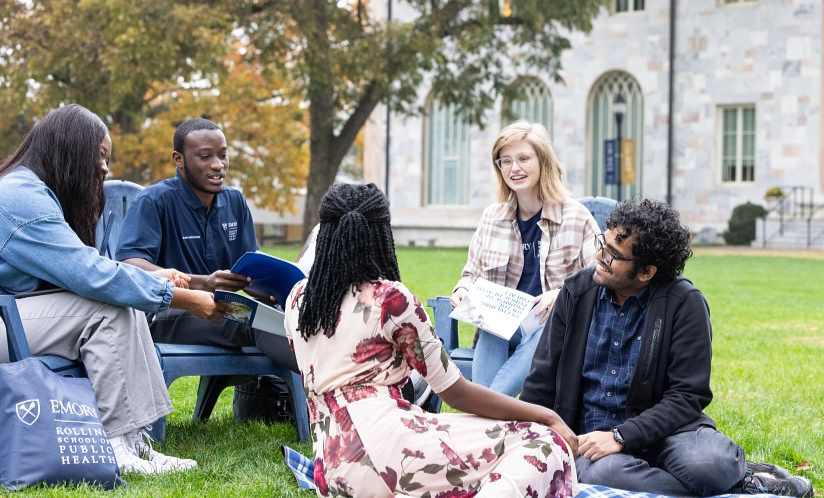Practicing Courageous and Compassionate Dialogue at Rollins

As we live through times of conflict and divisiveness as a school, country, and global community, it is critical that we learn to listen to and converse with each other. That is the ethos behind several new initiatives launched by the Office of Diversity, Equity, and Inclusion (DEI) at Emory’s Rollins School of Public Health this fall.
“It is a public health skill to be able to manage conversation and dialogue in a way that is inclusive and that brings people together to hear each other, even if they disagree,” says Joanne McGriff, MD, associate dean of DEI at Rollins.
McGriff says these new programs will allow faculty, staff, and students to feel confident and compassionate in conversation with community members at Rollins, in Atlanta, and beyond.
Enhancing Faculty and Staff Skills
“Something we were hearing from faculty and staff is that they didn't necessarily feel comfortable holding conversations that could be potentially emotional or controversial,” says McGriff. “We wanted to see Rollins employees build on those skills.”
To that end, McGriff’s office launched the Courage in Conversation and Connection training series in September 2024. The series was developed to share approaches and strategies that faculty and staff can use to facilitate productive and inclusive discourse and enhance communication. It was designed specifically for Rollins, being mindful of the context of working in academia and research.
During Courage in Conversation and Connection trainings, small groups of 30 people or fewer gather to learn and practice the skills they need to recognize their own emotional responses and manage conversations through them. In the past three months, 90 faculty and 130 staff have been trained across 11 sessions.
For faculty and staff who want to dive deeper into developing communication skills for emotionally charged situations, the Office of DEI also recently launched the C.A.R.E. (Communicating with Curiosity, Attention, Responsiveness, and Empathy) Fellows Program. McGriff partnered with Ed Lee, EdD, senior director of inclusivity at Emory College of Arts and Sciences (ECAS), to recruit 32 C.A.R.E. fellows from Rollins and ECAS.
Between now and early December, the fellows are being trained to address the connections between diversity, effective dialogue, and organizational excellence; to make disagreements generative and responsive to individual needs; and to build vibrant communities where people can present ideas, needs, and concerns clearly while respectfully and empathetically listening to others.
Cultivating Student Dialogue Excellence
Rollins student training in dialogue and communication begins as they work their way through online modules even before orientation.
“One of the first things that students do before they arrive at Rollins for orientation week is our DEI modules,” says McGriff. “That's the first opportunity we have to start building a culture of inclusive dialogue—whatever conversations they’re having, we want them to think about making space for others, embracing imperfection, and creating a brave space for conversation.”
Once incoming students get to their orientation in August, they have additional opportunities to expand upon these principles. All students complete an in-person DEI session with second-year DEI ambassadors where they review the tenants of what it means to be a Rollins citizen through role plays, group discussions, and digital competitions. Another opportunity comes through a popular optional session, which Lee facilitates, about public dialogue skills and advocacy. Starting next year, the session will be required for all incoming students to practice working through conflict and communication.
Now, Living Room Conversations (LRC) will be the newest way for students to continue practicing their dialogue skills. This program, a collaboration with the Emory Ombuds Office, follows a national model that connects community members through conversations that build trust and understanding. LRC will bring together students, faculty, and staff across Rollins in small groups to have guided conversations about topics spanning from anxiety, to artificial intelligence, to social identity.
McGriff hopes that these initiatives will allow members of the Rollins community to be leaders in compassionate conversation.
“When they show up to a job or community, we want our people to stand out as able to understand the interests and needs of others, so people feel that they've been heard, and they feel that they are valued,” she says. “That's going to make a big difference in advancing the inclusion and equity goals of public health.”